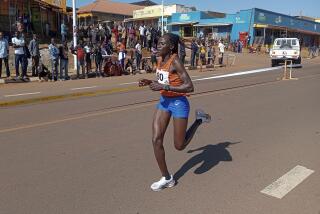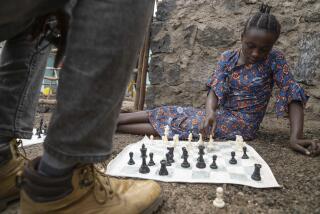Ugandan chess star tells her story to youths in Valencia
Phiona Mutesi’s journey from a Ugandan slum to the world stage as champion chess player was inspired by hunger.
“I was yearning for porridge,” the 16-year-old Mutesi said as she recalled how one day in 2005 she followed her brother to a place where poor kids gathered and she knew she would get food. There she met Robert Katende, a missionary, who was trying to improve the lives of local Ugandan children by teaching them to play chess on boards spread out on the dirt. Those who showed up got a free bowl of porridge.
The three-time Women’s Junior Chess champion of Uganda shared her story with young chess players last week during a visit to Trinity Classical Academy in Valencia, where she also played an exhibition game with four children.
Mutesi, who was living on the streets when she discovered chess, admits she kept returning to the makeshift youth center for food. But her talent quickly stood out, Katende said. Before long she was representing her country in international competitions, including this year’s World Chess Olympiad in Istanbul, Turkey.
Mutesi grew up in Katwe, a squalid area of the Ugandan capital of Kampala. Her mother struggled to feed her four children. Her father died of AIDS when Mutesi was just a toddler, she said in an interview.
Still learning English, Mutesi addressed the audience in her native Luganda as Katende interpreted. She told the audience that it took a while for her to develop interest in the game. At first, she said, “it was about the cup of porridge.”
The shy and soft-spoken Mutesi became the youngest person ever to win the African Chess Championship this year and the first Ugandan female with a chess title. She is the subject of the book “The Queen of Katwe: A Story of Life, Chess, and One Extraordinary Girl’s Dream of Becoming a Grandmaster,” by author Tim Crothers.
Mutesi said the moment she realized she might be good at chess was when she beat a boy.
Katende said Mutesi was helping to break down some of Uganda’s rigid gender barriers. She aspires to become a doctor.
Moises Robles, 14, a chess player, and his 11-year-old sister Moreliaof Santa Clarita said hearing Mutesi’s story inspired them.
“It has really encouraged me to play more chess and to keep on trying,” Moises said. “It’s not just for fun. It’s serious. It’s about how each person is important, and it’s important to work and never give up hope that you can become even better. “
A crowd gathered around as Mutesi wandered from table to table facing off with Trinity students Noah Chang, 13, Elizabeth Banescu, 10, and 11-year-olds Andrew Dever and Anthony Kirchmann. Jay Stallings, founder and director of the Valencia-based California Youth Chess League, who hosted Mutesi’s visit to the school, gave a running commentary explaining the move of each player on a chess board projected on a screen. Mutesi beat the Trinity students, but all said they learned something from her life story and her game.
Stallings said it was clear that Mutesi brought her slum experience of resourcefulness to the chess table.
“When I watch her game there are no pieces that stay back,” said Stallings, who is ranked as an “expert” with the U.S. Chess Federation. “She finds the best use for them. When you live in the slums you solve problems all day; you’re used to challenges.”
More to Read
Sign up for Essential California
The most important California stories and recommendations in your inbox every morning.
You may occasionally receive promotional content from the Los Angeles Times.










